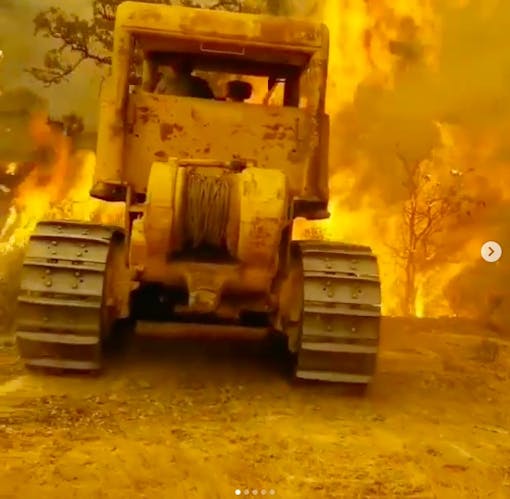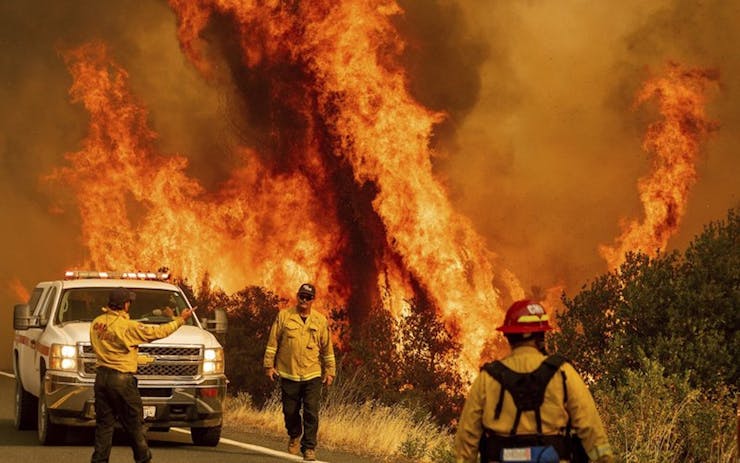Sean is a 39-year-old father of three boys and a cultivator for the Oakland, CA traditional marijuana market. With 20 years in the weed game, he’s also stubborn as hell, and his nine-year-old Alameda County farm puts food on his family’s table.
That stubbornness, plus economic survival, is why Sean tried to make a stand against one of the wildfires currently raging through California. The SCU Lightning Complex Fire had burned 347,196 acres with 10% containment as of Monday, Aug. 24. Sadly, that 10% containment did not include Sean’s farm.
On Wednesday, Aug. 19, Sean’s multi-million-dollar cannabis crop, his sheds, and equipment melted into puddles in tornados of fire—the air seemingly bursting into flames around him. Sean escaped with his life to warn Leafly readers: Don’t do what he did.
“You can’t rebuild if you stay there and try to fight this fire and die.”
Sean, ERB Farms, California
Record-breaking fire torching California
Everyone needs to pay attention to, and follow emergency evacuation warnings and orders this year, all across the West’s wildfire zones. Heat, drought, and years of dry fuel buildup have created the perfect conditions to touch off record-breaking infernos.
“I really just would like to scare people to where they respect this fire,” Sean told Leafly. “It gets bad fast and if you’re in the Bay Area, it’s just a matter of time.”
“I love my farm,” he said. “I would do anything for my farm. I thought of the money and my three boys. Everything I do is for them. But you can’t rebuild if you stay there and try to fight this fire and die.”
‘I watched the fire come right to me’
The year 2020 has tested everyone like no other, resilient cannabis growers included. In a series of intense Instagram posts, you can watch Sean’s life go from pastoral to apocalyptic in three days earlier this month.
On Aug. 15, Sean was posting gorgeous globs of all-natural GMO Cookies rosin. The veteran medical cannabis farmer prides himself on his plant’s organic nutrients and permaculture ways. He’s one of tens of thousands of legacy industry actors struggling to transition to the legal market. It’s a market of widespread local bans, and multi-million-dollar startup costs pricing out almost everyone. Due to the risk of enforcement and incarceration, we’re withholding Sean’s last name and other incriminating information.
On Aug. 17, Sean posted video showing his crew watering down his plants amid a triple-digit heat wave.

The following day, Instagram posts showed hills filled with ominous smoke—from 20 smoldering fires started by lightning strikes east of Oakland on the other side of the hills near Livermore.
“I had a foreboding feeling when I saw it,” he said. “There was smoke off in the distance in five different areas all around us.”
During a three-day stretch, Aug. 14-16, about 12,000 lightning strikes over Northern California ignited hundreds of local fires. Many merged to become three major “lightning complex” fires—the LNU, the CZU, and Sean’s SCU Lightning Complex.
“We thought it was OK and then we started seeing it over the ridge,” he recalled. “We were like, ‘Well, the wind’s blowing that way, and it always blows that way.’ But that was not the case. This flowed into the wind.”
“It was a two-day march to my farm. I watched the fire come right to me.”
‘If you can see that smoke, you’re not fucking good’
On Aug. 19, posts showed the neighborhood fire line, and he described how tranquil, hazy mornings gave way to afternoon heat, wind, and hell.
“It lulls you into thinking you’re safe; it’s so dangerous. But by noon, it starts getting hot and the wind starts picking up—boom, you’re in hell again.”
Determined to make a stand for his crop, crew, and livelihood, Sean figured he had 12,000 gallons of water, and 50-foot fire breaks, plus four CalFire bulldozers and two CalFire helicopters working the area.
But ultimately, the firefighters were “like kids with their finger in the dyke.”

He wanted to warn others: Being downwind of wildfire is not protective.
“I see a lot of people posting, ‘It’s blowing the other way, I’m good.’ No. You’re not good. Not fucking good. If you can see that smoke, you’re not fucking good. It doesn’t matter if the wind’s blowing the other way or not. [Burning] logs roll downhill. The shit moves forward.”
“The whole time this is going on, for three days, the wind is blowing it away from us, but it steadily came toward us. Up and down hills. All that.”
“Nothing stopped it,” he said. “It jumped roads. I saw this thing jump 100 feet into the wind.”
‘It rained down fire’
By Aug. 20, Sean’s videos showed the SCU Lightning fire at his farm’s doorstep—and he was using garden hoses to fight a brush-filled hillside of flame. He stayed until he and his crew were nearly engulfed, and all of them had to ultimately run for their lives. Clones from Purple City Genetics ignited behind him.
In retrospect, he said, he should have left when the firefighters did.
“As soon as that wind kicked up and the firestorm started, they all pulled out,” Sean said. “There’s no stopping it. The firefighters—they knew.”
Had he stayed any longer, Sean believes he would have been killed. “We were ready to jump into the water tanks,” he recalled, “but when I came back those water tanks had burned to the fucking ground. There’s nothing left.”

“Fire tornados sprung up. It fucking rained down fire. We were over there with hoses trying to put out these flames next to our trailers, like idiots.”
“Every one of your senses is different,” said Sean. “It’s a yellow haze. You cannot breathe. You cannot see. Your fucking skin’s burning. It’s really hot—it feels like looking into an oven.
“The wind can change in a second. One second you think you got this, you’re hosing it down, or whatever, and then the next second it blows toward you and all of a sudden you’re getting burnt, I mean from 100 yards away.”
“What I watched it do in two days, it did in 20 minutes. It will flow down a hill like a river. Not flame to flame, treetop to treetop. It doesn’t even look like fire. It looks like plasma or something. It was so weird. It looks like a living thing. It’s hard to describe.”
‘It will flow down a hill like a river’
The air seemed to explode, he said.
“It’s not even flames that’s burning you. It’s the air. It feels like someone put a hairdryer on you but at 1,000 degrees.”
“All the vegetation is getting so hot, it’s off-gassing and the gas is flammable, so the air is bursting into flames. I’ve never seen anything like it. It’s like somebody just opened a gas line and lit it on fire. I can’t explain it to people. I want them to know how important it is and how dangerous it is.”

“And the smoke—the smoke. Like, this isn’t regular smoke. This is poison oak, burning tires, glue from trailers 50 years old, and who knows what the fuck is in them. This is the craziest toxic thing.”
‘Dead foxes, dead rabbits, dead everything’
Part of the danger lies in the false sense of security that can set in. Daytime lulls in fire activity can make you think the worst is over.
On Aug. 21, Sean returned to the fire lines to help a neighbor who refused to evacuate.
“In the morning, nothing was going on,” Sean recalled. “There’s just puffs of smoke.”
“You think it’s all gone, but it’s not. These tree stumps burn for weeks. People even fall inside the ground into a culvert of fire that was a stump.”
Sean helped his neighbor, a retired Marine veteran, try to save his house, running when the flames encircled them both. His neighbor refused to leave.

“He was ready to die yesterday,” Sean said. “Everything he has is on that hill. We couldn’t take him out of there. He was going to fight us.
“Him and his son stayed there, and I just found out a couple hours ago that they saved the house. He literally drove into fire with a bulldozer. It burned his face.”
Sean’s learned it’s not worth it. ‘Life over property’ is no cliché. Where there is life there is at least hope.
In a later Instagram post, Sean surveyed what was left of his farm, making jokes about cheap cannabis for sale. It looks like an atom bomb test site. The asphalt road melted. The pot fields are fine white ash and deadly stillness.

“I saw dead foxes, dead rabbits, dead everything on the road. They were burned,” he said.
“If I was a smart man, I wouldn’t have did what I did. I could have saved a lot of stuff and got it off the hill and not jeopardized anyone’s life. I just want everybody to get everything off the hill and try to save as much as you can. Then come back to the farm and try to save it and not feel as bad.”
‘9 years of blood, sweat, and tears …’
This past Friday, Aug. 21, Sean drove to an East Bay underground cannabis marketplace —a “sesh.” There, friends had care packages waiting. He’ll start rebuilding from scratch.
“Nine years of blood, sweat, and tears in that place,” he said. “It’s going to be a really bad year for a lot of people. Already, it’s just been like a wham-bam-bam combo.”
Generous offers of help are pouring in, he said. Many more will be needed for far more people.
But cannabis people are pulling together.
“I’ve seen white market and black market all come together and hit me up. The power of people’s empathy and grace is amazing.”
Sean, E.R.B. Farms, California
“A lot of people say the community is fractured,” he said. “That’s not my experience. I’ve seen white market and black market all come together and hit me up. The power of people’s empathy and grace is amazing.”

California fires facts:
- 2,187 square miles across the state burned this year (bigger than the entire state of Delaware)
- 7 dead
- 10 fires in the last 24 hours; amid 2,300 lightning strikes
- 625 active fires across the state
- 1,200 structures (including homes) damaged or destroyed
- 2,200 in state-run emergency shelters
- 7,002 fires total in CA this year
- 14,000 firefighters in the field
- 24,300+ structures threatened (CZU Complex alone)
- 77,000+ evacuated (in NorCal)
(Source: San Francisco Chronicle, Aug. 24)





